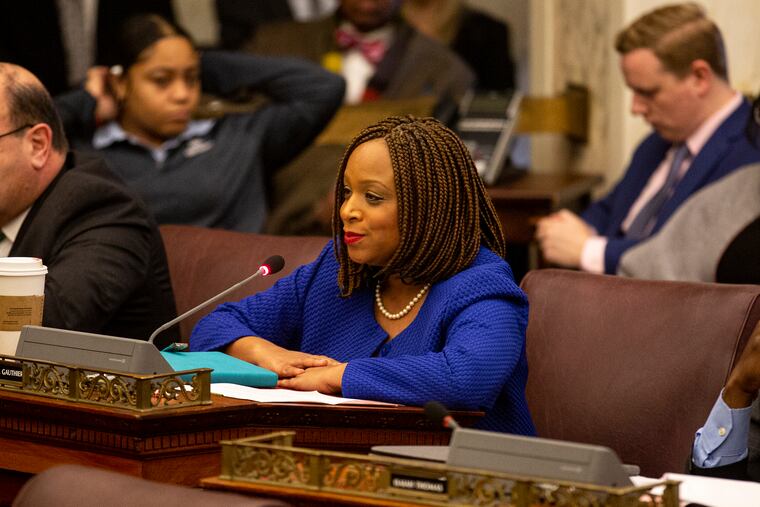City Councilmember Jamie Gauthier tries to preserve existing affordable housing in University City
A bill that passed in City Council on Thursday would expand the scope of an earlier law preventing demolition in parts of West Philadelphia.

West Philadelphia Councilmember Jamie Gauthier has won City Council’s backing to expand the geographic scope of a contested law that seeks to encourage new affordable housing and forestall demolition of existing housing in University City.
City Council passed the original legislation in March, in response to the redevelopment of the University City (UC) Townhomes. A federal contract to provide affordable housing there expired in 2021, and the owners, IBID Associates, plan to sell the site, forcing residents to relocate.
The displacement of dozens of lower-income families from a prized corner of West Philadelphia — near hospitals, a subway stop, and grocery stores — caused an immediate furor last year. Gauthier got a demolition ban passed to keep IBID from following through, and the developer sued her for allegedly violating its property rights. (That suit is ongoing, and Gauthier said she could not comment on pending litigation.)
Gauthier’s new legislation, which passed City Council Thursday, seeks to add more affordable housing projects to the original bill’s protections while encouraging more subsidized development.
“We were trying to protect affordable housing in University City that is threatened due to expanding commercial development in an amenity-rich area of the city,” Gauthier said. “We are expanding the geographic area to include additional transit-adjacent locations. It focuses on very large properties that are affordable housing and may be at risk.”
The legislation would need Mayor Jim Kenney’s signature to take effect. His administration is reviewing it, a spokesperson said.
The current law prohibits the demolition of any building larger than 20,000 square feet within the boundaries of Market and Ludlow and 39th and 40th Streets — the block that holds the UC Townhomes — until March 2023. The new bill includes four more areas, covering sites like the University Square Apartments, the Mercy Douglass Residences, the Joseph J. Hill Ralston/Mercy-Douglass homes, and Neighborhood Restorations at 45th and Market Streets.
The additional sites would also be protected by the demolition moratorium that expires in March 2023.
Gauthier’s new legislation would prevent demolition permits from being issued to developers unless they have a building permit in hand. “You have to show that you’re actually building something and not demolishing a property for speculative purposes,” she said.
The bill includes language designed to ensure that developments in these areas are eligible for zoning incentives to encourage taller and denser buildings — as long as they provide affordable units on site.
Developer groups argue that the bill could discourage future development of affordable housing.
Since the 1970s, the United States has largely depended on private developers making use of subsidy programs to provide below-market-rate housing. But the affordability provisions are time-limited, and after a set period, developers can opt out, as the owners of the UC Townhomes did.
Watching the pushback to IBID’s decision not to renew its affordable housing contract, and to sell its buildings, real estate industry interest groups say that others may be discouraged from using subsidy programs in future.
“The city is trying to encourage affordable housing development, but this lack of predictability does nothing but hurt affordable housing production,” said Mo Rushdy, vice president of the Building Industry Association (BIA). “If I don’t have the predictability that once the deed restriction is over I can do whatever I want with these units, I’m questioning” entering the affordable housing market.
Rushdy says a better way to help residents struggling with housing costs would be to develop homes on the myriad vacant lots in West Philadelphia, making use of proceeds from the tax on new construction that the BIA supported.
But Gauthier says she wants to preserve affordable housing that already exists, specifically in University City, where there are not many vacant lots, and where access to transit, jobs, and fresh food is strong.
“I want to ensure that West Philadelphians can live within walking distance of high quality jobs, education, health care, and goods and services,” Gauthier said in a speech Thursday before Council.
The Philadelphia Inquirer is one of more than 20 news organizations producing Broke in Philly, a collaborative reporting project on solutions to poverty and the city’s push toward economic justice. See all of our reporting at brokeinphilly.org.